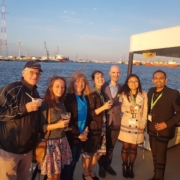Early career researchers discuss the future of probiotics and prebiotics in the first ISAPP-SFA paper
By Irina Spacova, ISAPP-SFA 2019 President and postdoctoral fellow at the University of Antwerp, Belgium
Early career scientists play a vital and dynamic role in research, especially in environments supporting their enthusiasm and drive for innovation. ISAPP has long been promoting young researchers through its Students and Fellows Association (ISAPP-SFA), which is a student-led branch of ISAPP established in 2009. The SFA was championed and guided from its inception through June 2020 by Prof. Gregor Reid. Together with ISAPP, the organization encourages diversity and participation through free memberships and ISAPP meeting travel grants open to all students and fellows working in research institutions. Currently, ISAPP-SFA includes 450 members from 50 countries in Asia, Africa, North and South America, Europe, and Australia.
The 2019 ISAPP meeting in Antwerp, Belgium was a milestone for ISAPP-SFA participation with 48 early career attendees from 19 countries. Facilitated by discussion clubs and poster sessions, the Antwerp meeting created an exceptional ‘melting pot’ of ideas. It was clear that young researchers had a lot to say, and the lingering idea of creating the first ISAPP-SFA paper finally took shape during the ISAPP 2019 dinner cruise of the Antwerp Harbor.
Less than a year later, the paper “Future of probiotics and prebiotics and the implications for early career researchers” was accepted in Frontiers in Microbiology, just in time for the 2020 ISAPP meeting. This initiative was driven by the ISAPP-SFA 2019 executive committee members Irina Spacova, Hemraj Dodiya, Anna-Ursula Happel, Conall Strain, Dieter Vandenheuvel, and Xuedan Wang. The core of the paper reflects what we as early career researchers believe are the biggest opportunities and challenges in advancing probiotic and prebiotic science, and summarizes a wide array of promising in vitro, in vivo and in silico tools. We emphasize the important goal of using probiotics and prebiotics to ameliorate global issues, and give examples of current initiatives in developing countries, such as Westernheadseast.ca and Yoba4Life.org. Our advice for early career researchers is to form inter-connected teams and implement the diverse toolsets to further advance the probiotics and prebiotics field.
We had a lot of fun with this paper, but also several challenges. It was not trivial to produce a concise paper with many opinions, techniques and references that would be useful to both young and established researchers. This intercontinental endeavor between young scientists working in Belgium, Japan, Ireland, South Africa, USA, and UK required a lot of early-morning and late-night meetings. Many interactions and discussions were necessary to deliver a novel perspective to add to the many excellent reviews on probiotics and prebiotics already published. Accessibility of the publication was a decisive factor, and one of the reasons why we chose to publish open access in Frontiers in Microbiology. Of course, this publication would not be possible without ISAPP, and we are especially grateful for the input and encouragement from Gregor Reid and Mary Ellen Sanders.





